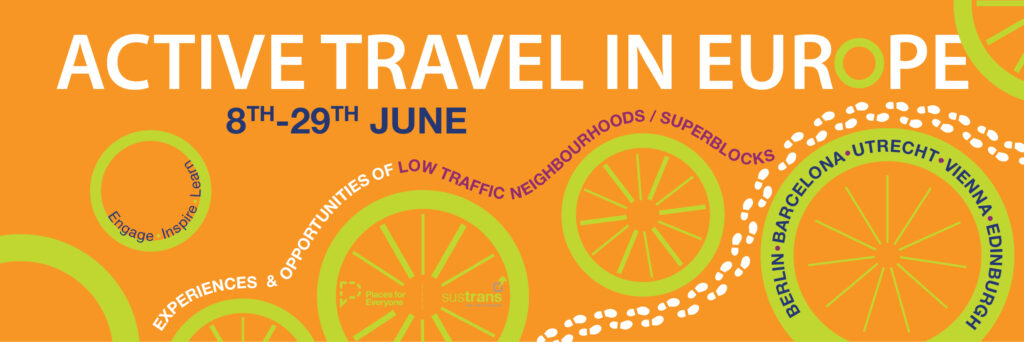
About the Series
In the second edition of the series Active Travel in Europe, we explored low traffic neighbourhoods, also known as superblocks, across Europe with practitioners from five different cities – Barcelona, Utrecht, Vienna, Berlin, and Edinburgh.
The fantastic selection of keynote speakers brought different perspectives and experiences in this year’s theme. Ragnhild Sørensen, Head of Communication at Changing Cities, discussed how they are creating superblocks (kiezblocks) from a bottom-up view in Berlin. Florian Lorenz and Georg Wieser of Studio LAUT presented their work on the first pilot superblock (supergrätzl) in Vienna, and the ongoing pan-European r+d project TuneOurBlock – which examines how to expand the superblock concept as a policy and strategy tool. Hans Karssenberg, partner at STIPO, gave a presentation about their work in creating a low traffic neighbourhood from scratch – in a new residential district of Utrecht.
Sílvia Casorrán Martos, Deputy Chief Architect at Barcelona City Council, discussed how superblocks (superilles) form a critical component of the city’s Urban Mobility plan. Patrick Kappert, board member of the Collective Superblock Poblenou neighbours organisation, joined us in our closing panel session to shed light on community organising through the development of Barcelona’s first superblock in Poblenou. Bringing the series back to Scotland, Miles Wilkinson, Senior Project Manager at City of Edinburgh Council, shared his experience of delivering Leith Connections, reducing traffic and improving walkability in Leith.
Finally, we closed this second edition of Active Travel in Europe with a panel session to address recurring themes such as community engagement and participation, political challenges, and placemaking.
You can revisit last year’s discussions by checking out the 2022 Active Travel in Europe event page.
Event Recap and Recordings
Recordings from presentations are available below and slides are posted where available. In addition, a resource pack is available that includes a number of articles, videos, and tools that speakers mentioned within their presentations. It is a non-exhaustive list and serves to provide additional reading.
Berlin
‘How Berlin is using a bottom-up approach’ was presented by Ragnhild Soerensen of Berlin-based advocacy organisation, Changing Cities.
Access the presentation slides. Password: LTNsummer2023
Utrecht
‘Developing for human scale: the city at eye level in Merwede, Utrecht’ was presented by Hans Karssenberg, partner at Dutch firm STIPO.
Related event: Placemaking Europe, Strasbourg, 26-29 September
Access the presentation slides. Password: LTNsummer2023
Vienna
‘The Viennese Supergrätzl and the quest to build research across Europe’ was presented by Florian Lorenz of LAUT Studio in Vienna.
Access the presentation slides.
Barcelona
‘Challenges in transforming public space and mobility in Barcelona’ was presented by Sílvia Casorrán Martos, Deputy Chief Architect at Barcelona City Council.
Access the presentation slides. Password: LTNsummer2023
Edinburgh
‘Leith Connections: navigating design and engagement in Edinburgh’ was presented by Miles Wilkinson of City of Edinburgh Council.
Panel Session
Speakers from the series were invited back for a closing panel session to be in conversation with each other and address recurring themes throughout the series. The panel session includes an additional speaker, Patrick Kappert of Collectiu Superilla Poblenou, a community group in Barcelona that was critical in the implementation of Barcelona’s first superblock.
Watch the recording below as we discussed engagement and participation, political challenges, and placemaking.